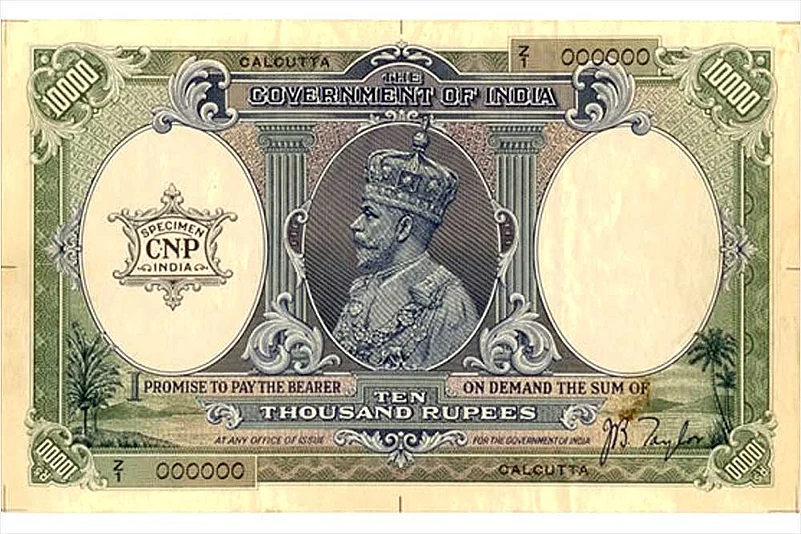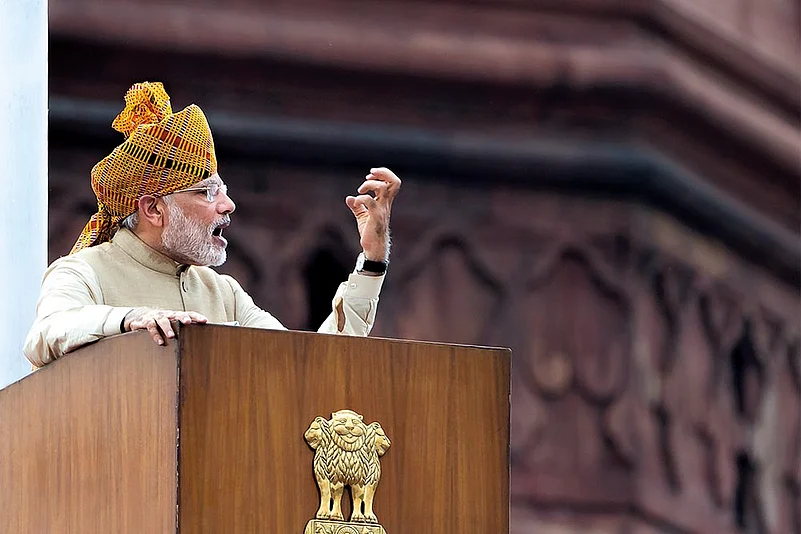It was barely a few hours before his address to the nation on November 8 that Prime Minister Narendra Modi took his cabinet colleagues into confidence about his dramatic decision to demonetise Rs 500 and Rs 1,000 currency notes. All senior cabinet ministers had been told to leave their mobile phones outside: it was in this secured environs that the prime minister shared his ambitious plan to curb black money and corruption with them, one that would be the talking point all over the country for days to come.
It was a momentous decision that sent shock waves down the whole system—as it was intended to do. The late evening announcement, and the narrow window offered before the order was to take effect, meant just about everybody was caught off-guard. Many wondered whether his move to bolster economy would pay off. But, in one fell swoop, Modi had sought to burnish his image as a decisive leader—a man given to big ideas and bold strokes—something that made him a hero of the middle class with a massive electoral mandate two-and-a-half years ago.
And this was an issue that resonated widely with that class. Not just that, there was some serious tactical leverage to be had beyond India’s urban centres and its black money hoards. Significantly, the initiative comes only a few months before crucial assembly polls in Uttar Pradesh and Punjab, where huge amounts of illicit funds are believed to be in circulation.
Sources close to the government let on that the demonetisation policy—pitched as a ‘surgical strike’ against black money, corruption, and fake currency notes that fund terror—was being evolved quietly for over six months. In hindsight, many of Modi’s colleagues in the party and government say there indeed had been straws in the wind about the ‘historic’ decision. “Stung by repeated taunts over his election promise on black money, Modiji was a man on a mission, especially after the Bihar elections. Nitish Kumar and Laloo Prasad Yadav never let go of any opportunity to rake up his pledge of waging a war on black money,” says a senior minister.
According to him, the PM hadn’t been exactly idle on globalised corruption, and was continually exploring his menu of options. “The issue had been taken up at various international forums, but there were bottlenecks,” he says. “The PM also set up a Special Investigation Team (SIT) to look into the issue in his first cabinet meeting. His intentions were never in doubt but things take time.”
There were other elements that were key in his scheme of things. Modi talked on several occasions about promoting plastic money to pave the way for cashless transactions. “The Jan Dhan project, the voluntary income disclosure scheme and GST—these were all part of his grand plan,” the minister says.
The incremental steps did not entirely yield the desired results, though. Senior BJP leader Murli Manohar Joshi admits the ambitious voluntary income disclosure scheme perhaps failed to unearth as much unaccounted money as the government had hoped for. “This might have prompted the push for demonetisation. It underlines the commitment of the party in general and the PM in particular to purge the economy of black money.”
A minister, who wished not to be identified, says that when Rahul Gandhi of the Congress derided the government’s amnesty scheme as ‘fair and lovely’ in the Lok Sabha, it did not go down well with Modi. “He did not respond to the criticism, but it made him all the more resolute to redeem his promise at the earliest,” he said.
It was soon apparent that Modi did not want to go into another election without living up to his word. With crucial assembly poll coming up, something needed to be done. “It had to be a big-bang announcement to make an impact ahead of the polls,” says a party leader. Several ministers and party leaders told Outlook, however, that demonetisation would have happened irrespective of that context.
Finance minister Arun Jaitley too dismissed the suggestion that the move was linked to upcoming elections. However, he conceded that “if the decision leads to making elections cheaper in terms of expenditure, then it is a good beginning”. Another leader adds, “If we keep bothering about political correctness, we will never be able to do anything. In a country like India, elections are taking place somewhere or the other all the time.”
Use of black money in elections has become rampant over the years with parties and candidates spending obscene amounts of funds to woo the voters. “Modiji often cited Atal Behari Vajpayee’s quote that every legislator starts his career with a lie about the election returns he files. He has always batted for a more transparent system so as to make it easier for the Election Commission (EC) to keep a tab on spending,” says a BJP leader.
Not that the BJP will shy away from any electoral advantage. Party chief Amit Shah described demonetisation as a “surgical strike on the menace of corruption and black money”, linking it rhetorically to the military strikes conducted across the border following the Uri terror attack. The idea of twin “surgical strikes” now ensures Modi will be the face of the party campaign. “His bold leadership will be at the centre of our campaign—that the party means what it says, and delivers it fearlessly,” another party leader said.

History Note
Rs 1,000 and Rs 10,000 bank notes were withdrawn in 1946. In 1954, Rs 1,000, Rs 5,000 and Rs 10,000 notes were reintroduced.
This is not without an element of risk. For, there are leaders who fear the PM’s decision might cause some distress and panic in the short term, particularly in rural areas, where the banking system still has a weak footprint—and any liability will also get attached to his name. But others trash the idea of a negative impact. “This is not likely to happen. In fact, people feel they are partners in the country’s fight against corruption and terror. That’s the feeling Modiji’s address invoked in them,” says a leader, referring to the ground report he got from villages of UP.
The Opposition, especially the Congress, found the occasion fit for another bout of criticism. P. Chidambaram, the UPA’s finance minister and no stranger to amnesty schemes, questioned the move on the ground of the inconvenience it would cause to the common man. Not wanting to be seen as an outright opponent to demonetisation, he extended support to the “objective of the government to stamp out black money,” but raised questions over the chosen method.
Another former finance minister was more forthcoming in his praise. “It’s a very good move, even if delivered in Modi’s characteristic, sensational style,” he told Outlook. Not wanting to be identified, he said it had come out as a revolutionary move. “If the Congress government had thought of implementing something like this, it would have taken it as an evolutionary process by taking everyone along,” he said.
Sources reveal that a similar scheme was suggested to the Congress-led UPA by then finance minister, and now President, Pranab Mukherjee. Manmohan Singh discussed it with his cabinet and shot it down after he failed to get a favourable response. Chidambaram, who succeeded Pranab as FM, admits the UPA too received similar suggestions on doing away with high denomination notes but it was felt that the economic gains might not be worth all the inconvenience it would cause to the common man.
Modi, however, was not one to fight shy of an occasion to take the bull by the horns. He had also raised the issue of political corruption in his address: “We talk about use of black money in elections. We have to set the country free from corruption and black money.”
Former chief election commissioner S.Y. Quraishi, a strong votary of cleaning up the electoral system, welcomes the decision wholeheartedly. He told Outlook that parties start mobilising money months before elections are announced, much before stringent checks are put in place. Money for the polls due early next year must have begun circulating already, he says. Demonetisation will now squeeze the cash flow ahead of elections as the new currencies will be issued under stringent RBI checks, he adds.
An EC official says their task had been made considerably easier. “We were gearing up to sniff out the black money that flows unabated during elections. Our checks had started and we had met bank representatives asking them to be alert to the use of large transactions. We were in the process of identifying constituencies vulnerable to use of black money,” he says.
In Bihar, for example, one-fourth of the total 243 constituencies were identified as vulnerable and a close watch was kept on them. The EC official says demonetisation would impact those candidates who used their own money, in addition to the funds they got from their party. “Political parties have bank accounts and the funds therein cannot be scrutinised since the parties are not bound to reveal their source of money. That money may still come into circulation but the individual candidates are as good as bankrupt now.” That already strikes deep at the rot.


























